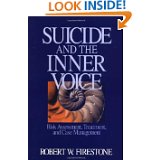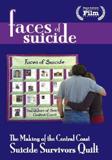I Want to Die
 Each day thousands of people are tormented by the thought, I want to die. If you’ve been having thoughts like this, we want to let you know that you are not alone. Many of us have experienced suicidal thoughts at some point in our lives. However, it is also important for you to know that the feeling of hopeless you may currently be experiencing is temporary; help is available and there is hope, even though you may not feel that way at the moment.
Each day thousands of people are tormented by the thought, I want to die. If you’ve been having thoughts like this, we want to let you know that you are not alone. Many of us have experienced suicidal thoughts at some point in our lives. However, it is also important for you to know that the feeling of hopeless you may currently be experiencing is temporary; help is available and there is hope, even though you may not feel that way at the moment.
The thought “I want to die,” usually comes up when people are in so much psychological pain that they feel they can no longer bear it. We understand how terrible this pain feels, and we want to help make it tolerable for you. This pain is often made worse by thoughts of being a burden to others or not belonging anywhere. The combination of these Critical Inner Voices and the emotional pain people are feeling can lead them to believe that they shouldn’t be alive and the people in their lives would be better off without them. However, this is never the case. Harming yourself will only hurt the people that you love. Studies show that each person who commits suicide directly impacts at least seven people. Furthermore, the feeling of being in unbearable pain will pass. The most important thing to do is to keep yourself safe while you are feeling this bad.
How to Make a Safety Plan
- First, recognize when you are starting to feel really bad, when things are starting to feel dark for you, or you begin to feel anxious. It is a lot easier to deal with these feelings when you catch them early.
- Plan specific actions that you will take when you start to feel bad. These will help interfere with two behaviors that fuel a suicidal state: passivity and isolation.
- What activity are you going to do to make yourself feel better? (ie: take a walk, play with your dog, bake brownies, meditate, watch a funny movie)
Where are you going to go to be with people and take your mind off your negative thoughts? (ie: to the mall, to the park, to an athletic event) - Who are you going call to talk to? (ie: a specific friend, relative, minister) Make sure that you have that person’s phone number.
- Do you have a therapist or counselor you can talk to? How can you contact them? Keep their contact information in your phone.
- And finally, make sure that you have the Suicide Hot Line Number – 1-800-273-TALK (8255) – in your phone
What To Do When You Think I Want to Die
Promise Not to Do Anything to Harm Yourself Right Now
Suicidal thoughts come and go. Even though you may be in a tremendous amount of pain right now, it is important not to act impulsively on your self-destructive thoughts. Make a promise with a friend, a therapist or with yourself that you will not do anything to harm yourself for a certain amount of time.
Many people find it helpful to follow the “3 day rule” when they feel as though they want to die. As one blogger, who has struggled with suicidal thoughts explains:
“For me I have a 3 day rule. If even for one moment you feel a smidge of joy or like life is actually worth living, you have to start the 3 days again.”
This rule does not imply, by any means, that someone should choose to die by suicide if three days go by without feeling hopeful. However, it can give people who are hurting some distance between the thoughts and the action. Putting time between the thoughts and the action saves lives, because no matter how permanent the pain may feel, the suicidal thoughts will come and go, they will not last forever.
Make Yourself Safe
Take the necessary precautions to make yourself safe. Remove any items you could use to harm yourself from your home. Do not isolate yourself.
Talk to Someone
People are often too nervous, ashamed or afraid to talk about the fact that they are having suicidal thoughts. However, sharing these feelings with someone you trust is often the first step to feeling better. Find someone you trust, such as a friend, therapist, family member, teacher, member of the clergy or counselor for a helpline. Let the person know how bad you are really feeling. Don’t be afraid to tell them if you are suicidal and/or have a suicide plan.
Seeking professional help from a therapist can be particularly helpful. Calling a helpline, such as the National Lifeline or Samaritans, can be an easy, free and anonymous way to get help. The helplines are open 24 hours a day and offer chat or email features, if you prefer to communicate by text.
Just talking about how you feel and how you got to this point in your life can be a huge relief and help you find a way to cope with the pain you are currently experiencing.
Avoid Drugs and Alcohol
Alcohol and drugs often intensify suicidal thoughts. Avoid all alcohol and any drugs that have not been prescribed to you by your doctor.
Regulate Your Sleep
Lack of sleep can contribute to depression and lead to an increase in suicidal thoughts. Try to regulate your sleep, aiming for eight hours a night. If you find yourself without any energy and sleeping most of the day, it is important to get up and try to do something active. Even if it feels, like the last thing in the world you want to do.
Exercise
Studies show that exercise can be as effective as antidepressants when it comes to treating depression and anxiety. Try to get your heart rate up for 20 minutes a day, five days a week; it has been scientifically proven to help you will feel better emotionally. Even just taking a walk around your neighborhood can help your body start to release endorphins, which reduces depression.
Challenge Negative Thoughts About Yourself
Suicidal thoughts are usually accompanied by a lot of other negative thoughts about ourselves. It is important to recognize that these negative thoughts are not accurate. They are a part of your Critical Inner Voice and you can challenge them.
Treat Yourself the Way You Would Treat a Friend
It is important to have compassion for yourself in your suffering. Instead of beating yourself up for feeling bad, try to treat yourself the way that you would treat a good friend. As Dr. Stacey Freedenthal suggests:
“Think of everything that is going wrong in your life. Think of all the reasons you have for dying by suicide. Now imagine that someone you care about very much came to you with the same problems, the same reasons, the same desires to die. What would you tell them? Would you say to this person you care about, “You’re right, you should kill yourself”? If not, why?”
The practice of treating yourself with the same kindness and compassion as you would treat a friend is called self-compassion. There are three steps to practicing self-compassion:
- Acknowledge and notice your suffering.
- Be kind and caring in response to suffering.
- Remember that imperfection is part of the human experience and something we all share.
Therapies that Help
There are several types of therapy that have been proven to reduce suicidal thoughts. Below we have included links to directories for therapists trained in these specific therapies.
Collaborative Assessment and Management of Suicidality
Medications that Help
There are many medications available to treat depression and reduce suicidal thoughts. There are over twenty different antidepressants currently approved by the FDA. It is important to work with a doctor to find the right medication for you. If you have tried antidepressants in the past but did not find them effective, it could be beneficial to try another kind.
Websites that Help
There are some fantastic resources online that can help when you feel like you want to die. We have included links to some of these websites below.
National Suicide Prevention Lifeline
American Foundation for Suicide Prevention
CALL:
The National Suicide Prevention Lifeline If you or someone you know is in crisis or in need of immediate help, call 1-800-273-TALK (8255). This is a free hotline available 24 hours a day to anyone in emotional distress or suicidal crisis.
International readers can click here for a list of helplines and crisis centers around the world.
TEXT:
The Crisis Text Line offers free 24/7 support. Text START to 741-741
Tags: anti-self system, critical inner voice, helping those that are suicidal, negative thoughts, self-destructive thoughts, Suicide, suicide advice, suicide prevention, teen suicide










